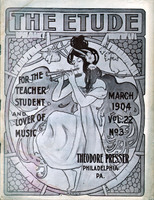BY ANNA E. BAILEY.
There are two totally irrelevant pursuits which have greatly helped me to an understanding of artistic pianoforte touch. At first blush they both appear strikingly far-fetched. They are: The study of voice placement and the practice of light calisthenics. Nor was the before-mentioned assistance rendered—as might occur to one—by the added physical strength engendered by these two occupations. No; that may not have come amiss, but the real benefit was something more tangible and direct. It was mental in its origin and physical in its outcome—the idea, in fact, of what I have designated as "mental touch."
At first, vocal study was to me the most elusive nonsense. The constant admonitions, "think your tone" and "take it mentally" seemed only high- sounding foolishness. I amused my teacher one day by saying in her hearing that I was learning to sing by "Christian science." The whole business did indeed remind me of the vaporous tenets which govern the followers of Mary Baker Eddy.
Greatly to my surprise, however, it soon dawned upon me that, when I concentrated my mind upon the top of my head, the tone actually did rise easily to that desirable sounding board. The whole body at rest—except the diaphragm, which must be firm— and the mind concentrated on the top of the head, with the front teeth and roof of the mouth as side issues of attention; that appeared to be the whole matter in brief.
One day, when I was playing the piano, it struck me, "Why not apply the idea of mental tone here? Piano playing is nothing but tone production through the medium of the fingers and arms." I concentrated my mind on my fingers. I thought of my body as at entire rest. The result was an unusually brilliant scale passage. It quite astonished me with its clearness and rapidity. I essayed an octave piece and focused my thought on my arms. Again I was pleasantly surprised.
Throughout my musical education I had been thoroughly steeped in William Mason's valuable and much-used "Touch and Technic." I was imbued with the theory of the devitalized arm and hand. My new thought reversed Mr. Mason's idea—that is, his idea as I had understood it. Under the sway of my new thought I found myself with a devitalized body, and a firm, alert hand ready for action. The same principle as that involved in my singing applied. The whole body at rest; in the former case, the mind concentrated on the head and teeth; in the latter, on the fingers and arms.
And now, in regard to the calisthenics. I cannot say that they gave me any really new idea. It was more a development of my previous one. I was following a system of which the charts and directions were sent by mail. Throughout the exercises were constant exhortations to concentrate the mind on the muscles used. "Exercise without will power is of little value," was a repeated warning. This furthered the thought that mental control is an important factor in all physical effort.
At last another little suggestion caught my attention. It arose from the frequently inserted remark, "Never hold the breath while exercising." I, myself, observed that holding my breath made my muscles tense and unresponsive. This impressed me as a possible hint for my piano playing. I watched myself and observed a tendency to hold my breath where any difficulty presented itself. The result was to add to the difficulty by making me rigid. A regular ebb and flow of the diaphragmatic breathing taught me by my singing teacher proved productive of a feeling of bodily ease and repose. A detached movement of my fingers and arms, while my body remained relaxed, became easier and easier as my new thought grew.
Perhaps I am wrong to say "new thought." Of course, there is nothing really new under the sun. All that I have been telling has been broached in different ways millions of times before. Sometimes, however, a new way of saying a thing makes it seem like a new idea. At least the new mode of expression may clothe the old subject with fresh interest and piquancy and arouse one to greater effort. That was the effect upon me and I hope it may do likewise for some other student of the piano.



